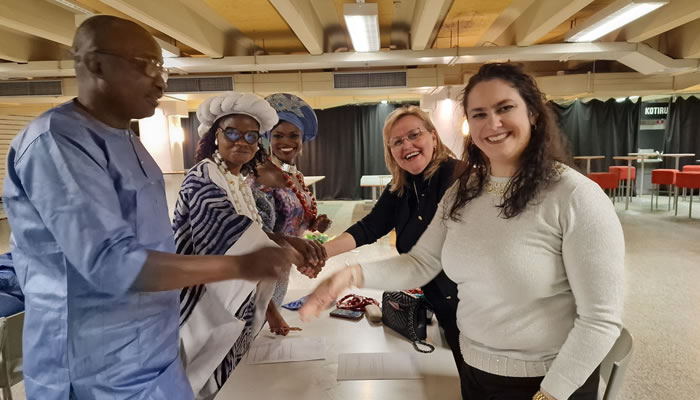Nigeria’s Fashion Industry Poised for Global Ascent: A Confluence of Favorable Factors
Nigeria’s fashion industry stands at the cusp of a transformative period, driven by a confluence of factors that position it as an increasingly attractive destination for global investors and designers. Local labor capacity, cost-effectiveness, and rising technical standards are converging with supportive government policies and shifting global economic dynamics to create a fertile ground for growth. This burgeoning sector is attracting attention for its potential to become a significant player in the international fashion arena, offering a competitive alternative to established production hubs. The devaluation of the naira, coupled with increased import tariffs on finished garments, has tilted the scales in favor of local production, making it more economically viable for Nigerian entrepreneurs and attracting foreign investors seeking lower labor costs. This shift is further amplified by the rising production costs in traditional Asian manufacturing centers like China, India, and Pakistan, prompting companies to explore new, cost-effective alternatives.
Strategic Partnerships and Knowledge Transfer: Paving the Way for Enhanced Capabilities
Crucial to this upward trajectory is the emphasis on knowledge transfer and skills development. The Association of Women in Fashion Tech (AWIFT) has forged strategic partnerships with European entities to facilitate training programs aimed at enhancing the technical expertise of Nigerian fashion professionals. These initiatives encompass a three-phase approach, incorporating in-person training in Nigeria, online follow-up sessions, mentorship programs, and culminating in practical training in Europe. This comprehensive approach fosters a "train-the-trainer" model, ensuring the dissemination of acquired knowledge throughout the Nigerian fashion ecosystem. The program, running through 2025, aims to equip local talent with the necessary skills to meet international standards and compete effectively on the global stage. This focus on capacity building is not only pivotal for elevating the quality of Nigerian fashion but also for preparing the industry to capitalize on the opportunities presented by the African Continental Free Trade Area (AfCFTA).
Technological Integration: Propelling Innovation and Efficiency in Fashion Production
Beyond traditional skills development, the integration of advanced technologies is revolutionizing the Nigerian fashion landscape. The adoption of AI-based design tools, CAD for 3D prototyping, and AR-powered virtual runways marks a significant leap forward, streamlining the entire value chain of garment production. These technological advancements empower designers and manufacturers to enhance creativity, optimize production processes, and reach wider audiences. The implementation of such technologies positions Nigeria at the forefront of fashion innovation in Africa, driving efficiency and competitiveness in the global market. This blend of traditional craftsmanship and cutting-edge technology creates a unique value proposition for the Nigerian fashion industry, attracting interest from international collaborators seeking innovative solutions.
AfCFTA and Global Market Access: Expanding Horizons for Nigerian Fashion
The implementation of the AfCFTA further amplifies Nigeria’s appeal as a fashion production hub. By reducing trade barriers and fostering intra-African commerce, AfCFTA opens doors for Nigerian fashion businesses to access a vast continental market. This expanded reach not only strengthens the domestic industry but also attracts foreign investors keen to leverage Nigeria as a gateway to the broader African market. The streamlined access provided by AfCFTA, coupled with Nigeria’s growing reputation for quality and innovation, creates a compelling proposition for international businesses seeking to expand their footprint in Africa. This strategic positioning reinforces Nigeria’s role as a key player in the continent’s burgeoning fashion sector.
Shifting Production Dynamics: From Import Reliance to Local Empowerment
The confluence of favorable factors has spurred a significant shift in production dynamics within Nigeria. With local production becoming more cost-effective and foreign imports declining, Nigerian manufacturers are gaining substantial ground. Importers, recognizing the advantages of local production, are increasingly turning to Nigerian manufacturers for their needs. This transition not only empowers local businesses but also fosters a more sustainable and self-reliant fashion ecosystem. The shift away from import reliance marks a pivotal moment for the Nigerian fashion industry, signaling a growing confidence in local capabilities and a commitment to fostering domestic growth.
Government Support and Policy Initiatives: Fostering a Thriving Fashion Ecosystem
The continued support of the Nigerian government through policies that favor local production and international partnerships is crucial for sustaining this momentum. By creating a conducive environment for businesses to thrive, the government can further solidify Nigeria’s position as a leading fashion hub in Africa. Promoting initiatives that encourage investment, skills development, and technological advancement will be essential for unlocking the full potential of the Nigerian fashion industry and realizing its ambition of becoming a global powerhouse. This collaborative approach between the public and private sectors is instrumental in driving innovation, creating jobs, and establishing Nigeria as a key player in the international fashion landscape.


